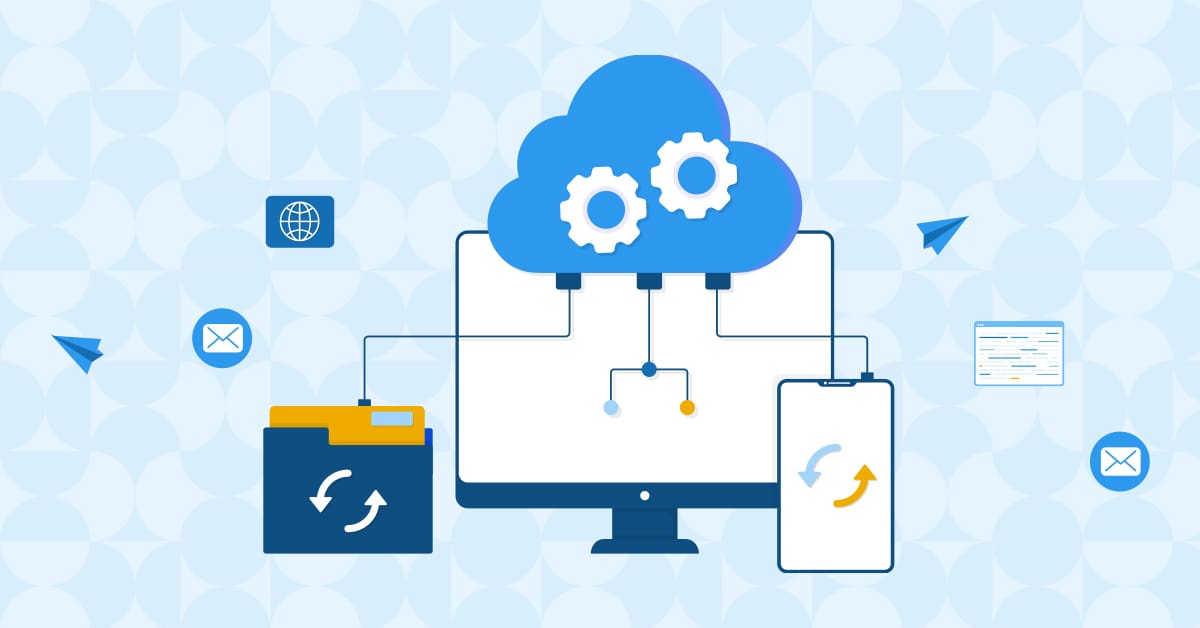
How Cloud-Based Solutions Are Shaping the Future of Logistics

This is a guest post from the Sigma Solve team.
Cloud technology has proven to be a miracle worker; whatever industry it touches becomes efficient, productive, and innovative. The logistics sector is one such beneficiary, with predictions saying the global cloud logistics market will grow nearly 14% from 2025 to reach over $46 billion by 2030.
Cloud-based logistics management solutions are revolutionizing the supply chain industry, from visibility enhancement to automation. Globally, they’ve improved the accuracy of demand forecasting by 26%, and cloud computing has helped logistical companies reduce their operational costs by 16%.
As the demand for logistics worldwide increases due to a booming eCommerce industry, cloud solutions support scalability, customization, and sustainability in logistical operations.
Understanding cloud-based logistical solutions
Cloud computing combines hardware and software with the internet to store, manipulate, manage, and access data and applications online. It serves as a remote storage and computing environment that you can connect to from any location.
Several companies stand out in the cloud-based logistics market by offering a variety of tools and services. They provide the infrastructure and technologies that have become integral to modern logistical operations:
- Amazon Web Services (AWS): Amazon offers logistics in the cloud through AWS. This service provides efficient computing structures that support robust logistics management.
- Microsoft Azure: Azure has introduced next-generation cloud services to develop smart logistical analytics and AI, which businesses can use to forecast and make strategic decisions about transport systems.
- Google Cloud: Google Cloud enables logistics through high-speed data processing tools, machine learning, and cloud management solutions.
- SAP and Oracle: These industry players offer end-to-end software solutions for cloud-based logistics, including transport management systems and warehouse platforms.
The advantages of cloud technology in logistics
The unrestricted hub architectures and power sharing of cloud computing platforms drive a high level of efficiency, adaptability, and affordability for the next generation of logistical systems.
Enhanced scalability and flexibility
Cloud logistics systems create flexible solutions when companies are unable to allocate the necessary resources for a particular activity at once but gradually increase their capacity. Additionally, businesses can scale their digital infrastructure up or down at their own volition, depending on their needs.
During periods such as holiday sales, for instance, E-business logistics companies can quickly expand their cloud transport management systems (TMS) to accommodate increased shipping demand without acquiring more physical assets.
Cost efficiency
Cloud-based logistics solutions eliminate the need to invest heavily in on-premises data centers and IT hardware. As a result, businesses free up capital and can allocate it to other, more critical functions instead of technological upkeep.
Logistics companies can now embrace affordable cloud computing strategies thanks to pay-as-you-go pricing models. This option allows them to manage their budgets and cut unnecessary technology expenses for the best utilization of available funding.
Real-time data and analytics
This technology incorporates GPS trackers, RFID tags, and IoT (Internet of Things) sensors that collect a vast amount of data to paint a coherent picture of freight transportation.
Logistics managers can therefore predict demand and disturbances more reliably, optimize routes, and schedule maintenance based on robust data analytics with just a few clicks.
Improved collaboration and communication
Cloud logistics’ approach increases the flow of information between the various stakeholders, eradicating barriers to communication while increasing the visibility of the processes involved.
By sharing shipping status, inventory status, and logistical information in real time, all parties can stay up to date on each procedural stage. It also streamlines the process for faster results.
Better security and disaster recovery
The software used in cloud-based supply chain management employs strong measures for encrypting, authenticating, and data monitoring. As a result, it minimizes operational interferences through backup systems and decentralized information storage to reduce the impacts of data loss and system breakdowns.
Challenges of implementing cloud technology in logistics
Cloud-based logistics solutions are exciting, but their application has some frustrating obstacles. The move toward wholly digital supply chain management gives rise to several technological and organizational challenges:
- Data privacy and security concerns: Data security is a concern with cloud technology in the logistics industry. Companies have access to information like customer details, shipment tracks, and financial details that must be protected from cyberattacks.
- Integration with legacy systems: Some businesses still use outdated systems in their operations. However, even with more advanced technological assets, companies need to verify their chosen cloud solution can integrate into their existing structures.
- Dependence on internet connection: Real-time logistics solutions rely heavily on stable, high-speed internet. In some areas of the globe and in developing countries, connection disturbances can significantly hinder cloud-based TMSs.
- Training and change management: The application of logistics technology requires a large investment in personnel. Employees need proper training to apply AI and other cloud-based applications to logistics.
Game-changing logistical solutions
Thanks to the introduction of cloud technology, several upgraded logistical aspects are empowering companies to operate, control, and monitor their supply chains with greater precision.
TMS
Cloud TMS allows logistics organizations to determine the optimal routes to save fuel and make faster deliveries. These intelligent systems combine multiple elements to produce top-notch transport solutions.
Companies gain automatic, real-time coverage of the global environment, enabling quick decision-making. Managers can track shipments, alter routes, and address complexities from any location as they arise.
Warehouse management systems (WMSs)
With cloud logistics systems, warehouse setups say good-bye to manual inventory identification, order picking, and shipping. These advanced platforms minimize the role of humans throughout the process, which, in turn, increases operational efficiency.
Many of today’s WMSs are based in the cloud and can fully integrate with other software to ensure a well-rounded and unified supply chain solution with real-time control. That adaptability makes them excellent for accurate inventory management and intelligent order processing.
Real-time GPS tracking and IoT integration
Real-time GPS tracking can integrate directly into cloud solutions to display shipment locations, routes, and even possible emergencies. Companies can thus track their products with pinpoint accuracy.
IoT in logistics gathers vast amounts of data about the field areas, which guides businesses in anticipating future logistical complications and taking necessary actions before they occur.
AI and machine learning
Predictive analytics in logistics improve demand forecasting and introduce advanced path planning and self-organizing algorithms that drive more intelligent decision-making.
Meanwhile, AI can transform logistics, for instance, by preventing maintenance issues with transportation fleets and using machine intelligence to tailor buying experiences.
Blockchain integration
Cloud-based blockchain technology provides the highest level of visibility and control, tracing goods through their long and circuitous supply chains around the globe. Moreover, the improved data accuracy lowers the number of cases of fraud through:
- Higher fraud detection rates: Accurate values like phone numbers and addresses help increase true positive rates for fraud detection above 90%.
- Reduction in false positives: One study from Cornell showed how automated feature engineering can minimize false positives by 54% in fraud prediction models, thus saving costs.
- Lower financial impact from bad data: Errors in bookkeeping cost businesses 15% of their income on average, or about $9.7 million in losses annually. This shows how critical data accuracy is in avoiding dissipation of resources.
How to choose the right solution
Selecting a cloud-based logistics solution requires careful evaluation of key factors to ensure it aligns with your business’s current operational needs and future growth. Search for the following characteristics in a potential option:
- Scalability: Seek out solutions you can upgrade as your needs escalate and operations demand more features to protect your data.
- Integration with existing systems: Ensure the solution can integrate easily into the other applications you use. This will minimize systematic disruptions and enable operations to continue optimally.
- User-friendliness and training resources: Search for interfaces with easy-to-implement features and comprehensive user guides to facilitate your team’s convenient usage.
- Customer support and provider reliability: Prospective cloud providers should have responsive technical support, high availability and reliability, and successful experience within the logistics sphere.
Future trends in cloud-based logistics solutions
As cloud technology continues to evolve, it’ll reshape the logistics industry as well. These innovations are anticipated to alter downstream supply chain processes and procedures in the coming years. Specifically, experts expect to see the following trends:
- Increased automation: Modern cloud logistics systems allow for the complete automation of warehouses, from picking robotics to autonomous inventory tracking. These advancements eliminate human interference, which may lead to uninterrupted workflows and boost productivity.
- The rise of smart cities: The “bright city” supply chain — a concept that leverages emerging technology to develop efficient, transparent, and sustainable supply chains — is anticipated to shift towards cloud-based management.
For example, tech companies are building mobile apps that plan unhindered delivery routes, adjust to shifting traffic patterns, and allow urban buyers to track their products precisely.
- Complementing 5G networks: 5G combined with cloud-based logistics systems creates ultra-fast networks that can immediately deliver tracking, analysis, and quicker supply chain responses.
- Sustainability: Cloud computing in logistics can improve and update networks, optimize resource allocation, eradicate waste to lessen a company’s carbon footprint, and support more environmentally-friendly management.
Real-world applications
Many global industry leaders have achieved impressive results after incorporating cloud solutions into their logistical operations. The following case studies demonstrate how this advanced computing is transforming supply chains and business functions:
- Amazon: As previously stated, Amazon is able to provide highly complex logistics in the cloud for inventory tracking and delivery. Using AI, the eCommerce giant has developed an effective and flexible supply chain environment.
Their cloud-based applications employ an intricate WMS coupled with tracking mechanisms. The result is robust customer demand predictions, effective warehouse management, and lightning-fast delivery guarantees.
- DHL: DHL has adopted efficient, real-time logistical solutions to redesign their global value chain. Their cloud TMS incorporates IoT to track consignments with impeccable accuracy. Precise and sophisticated monitoring yields real-time data on where packages are and their current state.
For instance, the company uses supply chain analytics to identify possible disruptions and alternative routes. Cloud computing also helps DHL respond promptly to consumer demands with the correct information about their shipments, which greatly increases business transparency and quality.
- Maersk: Maersk had to undergo a massive change by deploying end-to-end cloud solutions for the global container shipping industry. Employing the information flow approach, their integrated platform, Maersk Flow, interlinks the parties involved to provide efficient communication in complex international supply chains. Blockchain technology further enhances DHL’s reputation for being transparent and secure.
Maersk has embraced some of the most advanced cloud technologies to simplify what used to be very cumbersome shipping processes. Supply chain visibility provides real-time tracking that ensures the company can react rapidly to unexpected situations and alter routes to maintain customer satisfaction.
Wrapping up — Cloud technology is shaking up logistics worldwide
Cloud-based logistics management solutions have introduced a tremendous technological shift that’s changing how businesses manage their supply chains. They expand visibility into logistical processes, foster collaboration, and promote further systematic innovations. Providing greater procedural efficiency and worldwide accessibility, this technology is no longer a luxury but a necessity to keep pace in the competitive fulfillment landscape.
Logistics software development companies in the U.S. are of the opinion that this cloud revolution will continue to progress. With IoT, AI, and advanced analytics maturing, cloud logistics will evolve into more active, self-learning systems capable of solving complicated problems with high efficiency.
